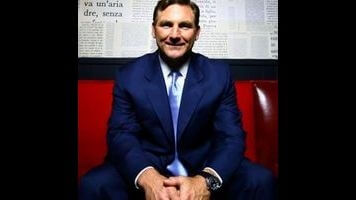30 For 30: "Muhammad And Larry"

The hook behind ESPN's 30 For 30 series — and, to be frank, the main reason we're covering it here — is that it presents compelling documentaries by name-brand directors that don't necessarily rely on a viewer's knowledge of, or even interest in, the sporting event that's being covered. I've been on board with the series since the beginning, and I found myself spellbound by the second episode, "The Band That Wouldn't Die", despite my minimal interest in football; Barry Levinson wisely focused on the way the departure of the Colts from Baltimore was a blow to the community, an event no less traumatic to the city than an ugly divorce would be to an individual. Handing over the reins to experienced filmmakers instead of sports videographers has given the network a chance to reach beyond its normal demographic confines and present something that makes a real argument in favor of the often-claimed universality of sports.
I'll be on board for the next two installments, both of which differ from the last three insofar as they're at least partial remakes for the directors. Next week's "Without Bias" is helmed by Kirk Fraser, and it's a reworking of his own documentary, Len Bias: The Legend You Know, The Story You Didn't; and this week, Albert Maysles — working with a young assistant named Bradley Kaplan — oversees "Muhammad And Larry". To call this episode a ringer would be putting it mildly; Maysles is half of the best documentary team in film history, and he's not only working with an unprecedented amount of archival footage, but it's footage that he and his brother David shot themselves 29 years ago. Their original film, Muhammad And Larry, was much shorter, and was never given a public screening, but the format of 30 For 30 gives Maysles a chance to expand on it and hammer home its essential tragedy.
There was already something like an aura of dread hanging over the 1980 championship bout between Muhammad Ali and Larry Holmes before it actually went down. Holmes had won the WBC title by a razor's-edge decision against hard-hitting Ken Norton, but he'd shored up his legitimacy in a series of solid defenses against the likes of Leon Spinks, Earnie Shavers and Tim Witherspoon. He wasn't expecting to have to face Muhammed Ali, coming off of a year-long retirement to seek an unprecedented fourth heavyweight championship. Ali was as much a hero to Holmes, his friend and former sparring partner, as he was to much of the rest of the country, and the idea of squaring off against him in a fight — at a time when no one believed that Ali, out of shape, damaged by years of injuries, medicated, and 38 years old, was anything like a serious contender. (Added poignancy comes from the fact that, unknown to anyone at the time, Ali was only four years from a diagnosis of Parkinson's Disease.)
In the footage leading up to the fight, Ali sports a mustache, making him look like the Mirror Universe evil version of the boxer who, even today, is nearly universally beloved; and there's plenty of instances of his dark side creeping out. In a limo on the way to the fight, Maysles mentions to a joking, swaggering Ali that he spent the previous day with "your friend", Larry Holmes; Ali's face immediately darkens. Eariler, Holmes had mentioned Ali's tendency to be your best friend as long as you were subservient to him; when you got in the ring with him, he'd beat you bad enough to make you bleed out of every orifice just to prove who was boss. When Ali asks what Holmes said about him, Maysles responds "He likes you"; Ali says "I like him too", but there's nothing but rage in his eyes.
Even the contemporary boxing writers (who are always a treat to see, even if their footage isn't as compelling as Maysles' fantastic footage of Ali's rustic backwoods training camp; is there a more stereotypically grizzled bunch of characters than boxing writers?) recognize that this is a story of evil. They describe the fight in terms of an "abomination", or a "crime"; Ali's former fight doctor, Ferdie Pacheco — who quit in 1978 when Ali wouldn't retire — says that everyone who had anything to do with the bout should have spent time in jail. The only problem is, it's a crime without a criminal, a evil deed without an evildoer. Everyone seems culpable for allowing a fight that clearly shouldn't have happened to go on, and there's one simple reason why. Ali's security man, Wali Muhammad, speaks it the first time we see him: "Money."
The fight promoters seeking to squeeze a big payday off of a name fighter past his prime; Ali's trainers, managers and hangers-on, knowing they'd be out of work if he didn't fight; the Nevada boxing commission, licensing a fight after seeing a medical report on Ali that Pacheco says wouldn't pass muster for a middle-aged accountant; the sports media, looking for one more big story out of a living legend; and Ali himself, utterly unwilling to admit that his time might be past, that his moment might be over, that, despite the charming footage of him performing sleight-of-hand magic for nerdy kids coming to visit his training camp, he might not have one last trick up his sleeve. "Ali was the last man to know he shouldn't make the fight," sighs Pacheco.








































